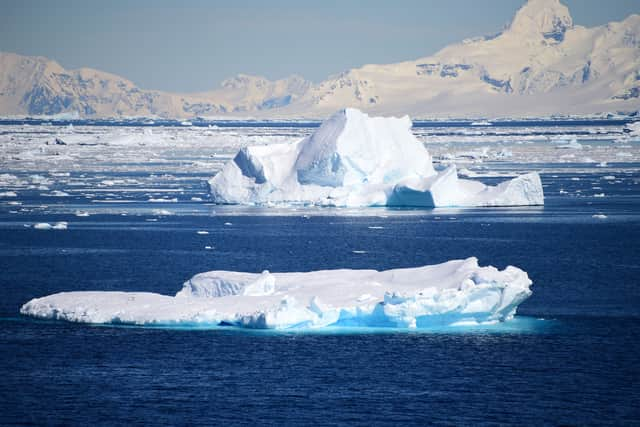Arctic sea ice set to be wiped in just 10 years thanks to human-driven global warming, study warns
This article contains affiliate links. We may earn a small commission on items purchased through this article, but that does not affect our editorial judgement.
and live on Freeview channel 276
It is “too late” to save summer ice in the Arctic despite scientists warning about its loss “for decades”, a new study suggests.
It is feared Arctic summer sea ice could be wiped out in as little as 10 years - a decade earlier than previously predicted - due to human-induced climate change..
Advertisement
Hide AdAdvertisement
Hide AdScientists have warned that even if greenhouse gas emissions are sharply reduced it still won’t be enough and the Arctic will be ice-free in the coming decades.
The bleak new study, led by Professor Seung-Ki Min of Pohang University, South Korea, found that 90% of the melting is the result of human-caused global heating.
Professor Min told the Guardian: “Unfortunately it has become too late to save Arctic summer sea ice. This is now the first major component of the Earth system that we are going to lose because of global warming. People didn’t listen to our warnings”.
He warned that extreme weather could be on cards as a result, and countries in North America, Europe and Asia should prepare for the worst of this.
Advertisement
Hide AdAdvertisement
Hide Ad

In 2021, the Intergovernmental Panel on Climate Change (IPCC) concluded that the Arctic would not lose its summer ice if greenhouse gas emissions were cut and global temperature rises were limited to 2C. It also said that in high emission scenarios the Arctic would lose its summer ice in the 2040s.
But the new research states that summer sea ice in the Arctic will be wiped out by 2050 even in the low emissions scenario, and under high emissions it will be gone by 2030.
Scientists did not say an exact year for the first ice-free summer as the Arctic is subject to several natural environment occurrences including heatwaves that can accelerate ice melt and volcanic eruptions which can slow it down - as the ash blocks the sunlight from reaching the ice.
The scientists said that the results of the new study “emphasise the profound impacts of greenhouse gas emissions on the Arctic” and “demonstrate the importance of planning for and adapting to a seasonally ice-free Arctic in the near future”.
Advertisement
Hide AdAdvertisement
Hide AdThey added that ice-free summers in the Arctic “would affect human society and the ecosystem both within and outside the Arctic”.
Arctic sea ice plays an essential role in the world’s ecosystems as it contributes to surging global sea levels. The bleak outlook of an ice-free region in Arctic summers would leave many species homeless including polar bears as well as indigenous people.
US scientists announced in February that the Antarctic sea ice hit a new record low in the 45 years of satellite record-keeping.
In the southern hemisphere summer of 2022, the amount of sea ice dropped to 1.92m sq km on 25 February, an all-time low but by 12 February this year the record was broken.
Advertisement
Hide AdAdvertisement
Hide AdThe ice reached a record low of 1.79m sq km on 25 February beating the previous record by 136,000 sq km – an area double the size of Tasmania.
The Antarctic ice sheet is estimated to contain about 30m cubic kilometres of ice and if completely melted it would be enough to raise the global sea level by 70m over centuries.
Comment Guidelines
National World encourages reader discussion on our stories. User feedback, insights and back-and-forth exchanges add a rich layer of context to reporting. Please review our Community Guidelines before commenting.
